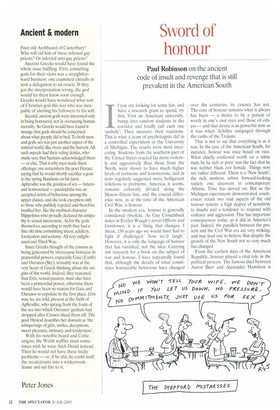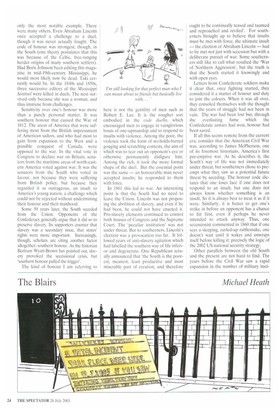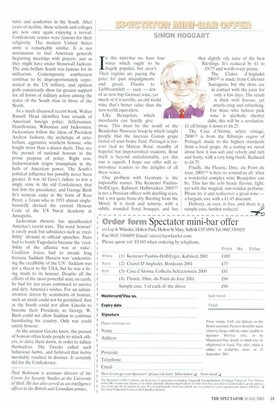Sword of honour
Paul Robinson on the ancient code of insult and revenge that is still prevalent in the American South 1 f you are looking for some fun, and have a research grant to spend, try this. Visit an American university, bump into random students in the corridor and loudly call each one 'asshole'. Then measure their reactions. This is what a team of psychologists did in a controlled experiment at the University of Michigan. The results were most interesting. Students from the southern part of the United States reacted far more violently and aggressively than those from the North, were shown to have much higher levels of cortisone and testosterone, and in tests regularly suggested more belligerent solutions to problems. America, it seems, remains culturally divided along the Mason-Dixon line, and the crucial difference now, as at the time of the American Civil War, is honour.
In the modern era, honour is generally considered obsolete. As Guy Crouchback notes in Evelyn Waugh's novel Officers and Gentlemen. it is a 'thing that changes. I mean, 150 years ago we would have had to fight if challenged. Now we'd laugh.' However, it is only the language of honour that has vanished, not the idea. Carrying out research for a book on the subject of war and honour, I have repeatedly found that, although the details of what constitutes honourable behaviour have changed over the centuries, its essence has not. The core of honour remains what it always has been — a desire to be a person of worth in one's own eyes and those of others — and that desire is as powerful now as it was when Achilles rampaged through the ranks of the Trojans.
That is not to say that everything is as it was. In the case of the American South, for instance, honour was once based on race. What chiefly conferred worth on a white man, be he rich or poor, was the fact that he was neither black nor female. Things now are rather different. There is a 'New South', the rich, modern, urban, forward-looking society one discovers in contemporary Atlanta. Time has moved on. But as the Michigan experiments demonstrated, southerners retain two vital aspects of the old honour system: a high degree of sensitivity to insults and a tendency to respond with violence and aggression. This has important consequences today, as it did in America's past. Indeed, the parallels between the present and the Civil War era are very striking, and may lead one to believe that despite the growth of the New South not so very much has changed.
From the earliest days of the American Republic, honour played a vital role in the political process. The famous duel between Aaron Burr and Alexander Hamilton is only the most notable example. There were many others. Even Abraham Lincoln once accepted a challenge to a duel, though it was never actually fought. The code of honour was strongest, though, in the South (one theory postulates that this was because of the Celtic, free-ranging herder origins of many southern settlers). Had Boris Johnson been editing this magazine in mid-19th-century Mississippi, he would most likely now be dead. Taki certainly would be. In the 1840s and 1850s, three successive editors of the Mississippi Sentinel were killed in duels. The next survived only because she was a woman, and thus immune from challenges.
Sensitivity over one's honour was more than a purely personal matter. It was southern honour that caused the War of 1812. The areas of America that were suffering most from the British impressment of American sailors, and who had most to gain from expansion to the West and a possible conquest of Canada, were opposed to the war. In the vital vote in Congress to declare war on Britain, senators from the maritime areas of north-eastern America voted against war. It was the senators from the South who voted in favour, not because they were suffering from British policy, but because they regarded it as outrageous, an insult to America's young nation, a challenge which could not be rejected without undermining their honour and their manhood.
Some 50 years later, the South seceded from the Union. Opponents of the Confederacy generally argue that it did so to preserve slavery-. Its supporters counter that slavery was a secondary issue, that states' rights were more important. Increasingly, though, scholars are citing another factor altogether: southern honour. As the historian Bertram Wyatt-Brown has pointed out, slavery provoked the secessional crisis, but 'southern honour pulled the trigger-.
The kind of honour I am referring to here is not the gentility of men such as Robert E. Lee. It is the rougher sort embodied in the code due/to, which encouraged men to engage in vainglorious bouts of one-upmanship and to respond to insults with violence. Among the poor, the violence took the form of no-holds-barred gouging and scratching contests, the aim of which was to tear out an opponent's eye or otherwise permanently disfigure him. Among the rich, it took the more formal shape of the duel. But the essential point was the same — an honourable man never accepted insults: he responded to them with force.
In 1861 this led to war. An interesting point is that the South had no need to leave the Union. Lincoln was not proposing the abolition of slavery, and even if he had been, he could not have enacted it. Pro-slavery elements continued to control both houses of Congress and the Supreme Court. The 'peculiar institution' was not under threat. But to southerners, Lincoln's election was a provocation too far. It followed years of anti-slavery agitation which had labelled the southern way of life inferior and degenerate. One Republican actually announced that the South is the poorest, meanest, least productive and most miserable part of creation, and therefore ought to be continually teased and taunted and reproached and reviled'. For southerners brought up to believe that insults must be met with force, the ultimate insult — the election of Abraham Lincoln — had to be met not just with secession but with a deliberate pursuit of war. Some southerners still like to call what resulted the 'War of Northern Aggression', but the truth is that the South started it knowingly and with open eyes.
Letters from Confederate soldiers make it clear that, once fighting started, they considered it a matter of honour and duty to join the colours. When it was all over, they consoled themselves with the thought that the years of struggle had not been in vain. The war had been lost but, through the everlasting fame which the Confederate armies had won, honour had been saved.
If all this seems remote from the current era, consider that the American Civil War was, according to James McPherson, one of its foremost historians, America's first pre-emptive war. As he describes it, the South's way of life was not immediately under threat, but southerners chose to preempt what they saw as a potential future threat by seceding. The honour code dictates that one loses face if one does not respond to an insult, but one does not always know whether something is an insult. So it is always best to treat it as if it were. Similarly, it is better to get one's strike in before an opponent has a chance to hit first, even if perhaps he never intended to attack anyway. Thus, one secessionist commented in 1860 that if one sees a sleeping, curled-up rattlesnake, one doesn't wait until it wakes and unwraps itself before killing it: precisely the logic of the 2002 US national security strategy.
Other parallels between the old South and the present are not hard to find. The years before the Civil War saw a rapid expansion in the number of military insti tutes and academies in the South. After years of decline, these schools and colleges are now once again enjoying a revival. Confederate armies were famous for their religiosity. The modern United States army is remarkably similar. It is not uncommon to find American generals beginning meetings with prayers, just as they might have under Stonewall Jackson. The ante-bellum South was famous for its militarism. Contemporary southerners continue to be disproportionately represented in the US military, and opinion polls consistently show far greater support for all forms of military action among the states of the South than in those of the North.
In a much discussed recent book. Walter Russell Mead identifies four strands of American foreign policy: Jeffersonian, Hamiltonian, Wilsonian and Jacksonian. Jacksonians follow the ideas of President Andrew Jackson, the archetype of antebellum, aggressive southern honour, who fought more than a dozen duels. They see the pursuit of national honour as the prime purpose of policy. Right now. Jacksonianism reigns triumphant in the halls of American power. The South's political influence has possibly never been greater. It was Al Gore's failure to win a single state in the old Confederacy that lost him the presidency, and George Bush Sr's nemesis came in the form of Ross Perot, a Texan who in 1953 almost singlehandedly devised the current Honour Code of the US Naval Academy at Annapolis.
Jacksonian rhetoric has spearheaded America's recent wars. The word 'honour' is rarely used, but substitutes such as 'credibility' abound in official speeches. Nato had to bomb Yugoslavia because the `credibility of the alliance was at stake'. Coalition forces had to invade Iraq because Saddam Hussein was `undermining the credibility of the UN'. Saddam was not a threat to the USA, but he was a living insult to its honour. Despite all the efforts of the most powerful state on earth, he had for ten years continued to survive and defy America's wishes. For an administration driven by sentiments of honour, such an insult could not be permitted. Just as the South could not allow Lincoln to become their President, so George W. Bush could not allow Saddam to continue humiliating his country. Only war could satisfy honour.
As the ancient Greeks knew, the pursuit of honour often leads people to attack others, to drive them down, in order to inflate themselves, The Greeks called such behaviour hubris. and believed that hubris inevitably resulted in disaster. It certainly did for the Confederacy.
Paul Robinson is assistant director of the Centre for Security Studies at the University of Hull. He has also served as an intelligence officer in the British and Canadian armies.




























































 Previous page
Previous page